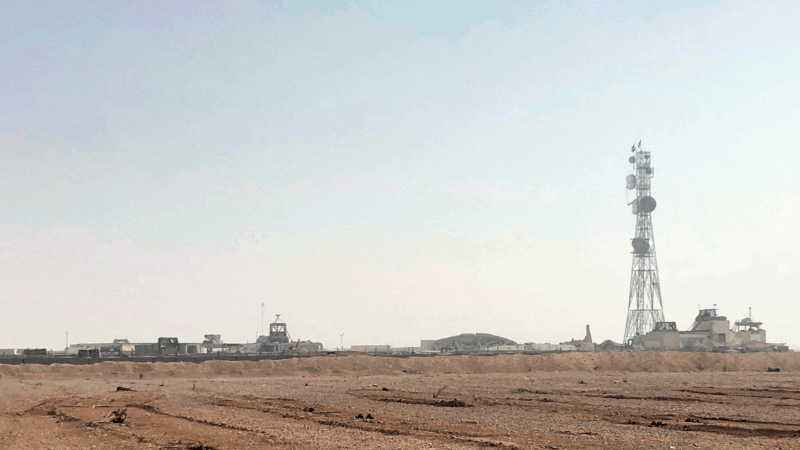Free Press Post 9-11
This is a military town. It’s home to the Army’s Redstone Arsenal, which along with the Marshall Space Flight Center, employs roughly 10-thousand people. So journalists like Huntsville Times Business Editor Shelley Haskins are used to dealing with a certain amount of red tape.
“The military has never been buddy-buddy with reporters, imbedding aside. But we have always had a decent relationship.”
But that relationship has been strained in the past year and a half ‘ and not just because of sensitive stories like terrorism and the war with Iraq. On this day, reporter Gina Hannah is having trouble getting the military to comment for a feature article she’s writing on local high schoolers who’ve chosen to enlist.
‘The Army recruiter has refused to comment on the record that fewer kids are coming in to sign up.’
Adds Haskins, ‘it’s going to sound pretty odd to have a story about army recruiting and not have a comment from the army. But, I guess we’ll have to do that. And it will be there fault.’
Haskins says his reporters have also had a hard time getting information from the hundreds of private engineering companies that do business with the military. Huntsville is the nation’s second largest research park behind Research Triangle in North Carolina.
‘Remember when they were talking about the 20-thousand pound MOAB ‘ the mother of all bombs. AP moved a picture of the MOAB and on the back of it in letters as big as a McDonald’s sign it said Dynetics. And Dynetics is a Huntsville company. So we call Dynetics and ask ‘ did you guys develop this MOAB? What part did you play in it?’
The answer was ‘no comment.’ Believing that local residents would want to know if the large bomb – making news was manufactured in their backyard, the newspaper resorted to running that photo of the MOAB, with the Dynetics name prominently displayed, and a caption that said the Airforce and Dynetics would neither confirm nor deny their involvement.
‘It is our job to reflect what goes on in the local economy. We make space ships and we make weapons. To ‘neither confirm nor deny’ when there is a picture that is disseminated over the Associated Press wires, it’s an insult to my intelligence!’
Dynetics spokeswoman Michelle Reavis says non-disclosure clauses are a common feature of most government and commercial contracts.
‘At Dynetics we haven’t changed the way we respond to media since 911. For us it’s just a matter of honoring our contracts with customers.’
That may be, but journalists across the country say there’s a whole lot of information that used to be available to them that now isn’t. Under the Patriot Act and the Homeland Security Act, the government has sealed information about immigration proceedings’ To protect the country from possible attacks, they also removed from government websites details on the safety of chemical and nuclear plants. Nearly half of the states have also new passed legislation that closes meetings or seals records.
What troubles some critics the most is a provision in the Homeland Security Act that allows private companies to keep secret – environmental and safety information that they believe could compromise security. Ginger Tomlin, dean of the Birmingham School of Law, worries that people don’t know ‘ or perhaps even care ‘ about the new restrictions on the press.
‘I would ask the general populace, where they get their information. They get all of their information about what the government’s doing, what the new proposals are, and what the implications of those are through the media. They either read the newspaper, listen to the radio, or they listen to television.’
In the WIAT-Channel 42 newsroom in Birmingham, News Director Larry Ragan says he hasn’t had any problem getting information out of local officials, even those at the chemical weapons incinerator the army plans to fire up just down the road.
‘I would say the military, particularly over at that base, has stepped up its PR. They mail us or fax us information. They’ve been very helpful.’
When I asked Ragan whether he’d encountered problems getting secret background information about his military neighbors using the Freedom of Information Act ‘ problems other journalists have reported since 9-11 ‘ he said he couldn’t remember ever pursuing that kind of information for a story. Law school dean Ginger Tomlin worries if there’s not a groundswell of concern about the growing restrictions on journalists ‘ not just from large newspapers and national broadcast outlets, but from journalists in smaller markets and especially from news consumers ‘ there may be irrevocable damage to the free press.
‘I really do fear we are going down a slippery slope because I don’t see anything stopping it.’
For U.S. pairs skater Danny O’Shea, these Olympics are 30 years in the making
Danny O'Shea turned 35 at his first Olympics, after three decades of skating and two reversed retirements.
Want a mortgage for under 3% in 2026? Meet the ‘assumable mortgage’
Low mortgage rates from the COVID era might still be attainable for homebuyers, if they find the right house and have the cash.
Epstein files fallout takes down elite figures in Europe, while U.S. reckoning is muted
Unlike in Europe, officials in the U.S. with ties to Epstein have largely held their positions of power.
Four people on NASA’S Crew-12 arrive at the International Space Station
The crew will spend the next eight months conducting experiments to prepare for human exploration beyond Earth's orbit.
American speedskater Jordan Stolz wins second Olympic gold with 500-meter race victory
With the win, Stolz joins Eric Heiden as the only skaters to take gold in both the 500 and 1,000 at the same Olympics.
US military reports a series of airstrikes against Islamic State targets in Syria
The U.S. military says the strikes were carried out in retaliation of the December ambush that killed two U.S. soldiers and one American civilian interpreter.






